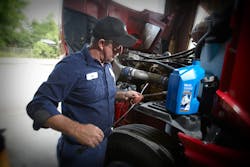Chevron’s McGeehan on PC-11 oil progress
Work on creating the next heavy-duty diesel engine oil standard-- known in its current, embryonic form as Proposed Category 11-- is running on schedule to meet the planned “delivery” of new lubricants to both the on-highway vehicle and off-highway equipment markets come January 2016.
That’s the word this week from Jim McGeehan, global manager of diesel engine oil technology for Chevron Lubricants, who as chair of the American Society of Testing & Materials (ASTM) Heavy-Duty Oil Classification Panel for the past 25 years is now front and center for the development of the eighth American Petroleum Institute (API) diesel oil-service category in a row.
Actually, as McGeehan told FleetOwner’s editors yesterday, it is ever more likely that PC-11 will birth not one, but two new API oil-service categories.
According to McGeehan, PC-11 will not result in one new oil type because having just one oil that will “do it all” for every user is not feasible.
He explained that while off-road OEMs have indicated they want an oil that is fully backward-compatible, as they are more concerned with engine durability than fuel economy.
On the other hand, McGeehan continued, on-highway OEMs are looking for oil that will help them meet upcoming federal regulations designed to drive down carbon-dioxide emissions while driving up miles per gallon.
The first of these—likely to be called API CK-4— will be engineered to be fully backward-compatible with previous API service categories (going back to CH-4) while providing increased engine protection for engines boasting the latest technology.
The second category—which he referred to for the time being as “API XX”—will provide engine protection but also feature lower viscosity so that it can help improve fuel economy. McGeehan said oils in this category will be “OEM-dependent”-- meaning it will be up to engine manufacturers to recommend or require truck buyers to use them.
The lubricant-industry entity charged with recommending whether to proceed with a new API oil category is called the New Category Evaluation Team (NCET).
The NCET is comprised of representatives from the Truck and Engine Manufacturers Assn. (EMA), API, and the American Chemistry Council (ACC) as well as members drawn from oil additive suppliers and industry testing labs.
According to McGeehan, the NCET will formally decide sometime next year whether PC-11 will indeed result in the two new oil categories he described.
Some engine and bench tests will be carried over from the development of CJ-4 based on their “current robustness,” McGeehan advised. He also pointed out that several new tests are being developed for this category along with corresponding test-limit recommendations.
“The goal,” he explained, “is to have tests that separate oils on performances. A decision on which tests will stay in is due in June 2013, but it could go six months later if a test requires more data to prove it out.”
However, he pointed out that despite the emphasis on fuel economy that is part of PC-11, the proposed category will not contain an engine or truck test for fuel economy performance.
Lower-viscosity oil grades— 15W40, 10W30 and 5W30-- will be a prominent aspect of PC-11 as the category continues to be developed into one or two new API ratings, McGeehan added.
“We at Chevron believe the benefits that the PC-11 oil category will ultimately deliver to engine owners in January 2016 will more than offset the increased purchase cost” [due to the expensive development process] of the new oil(s), he concluded.
